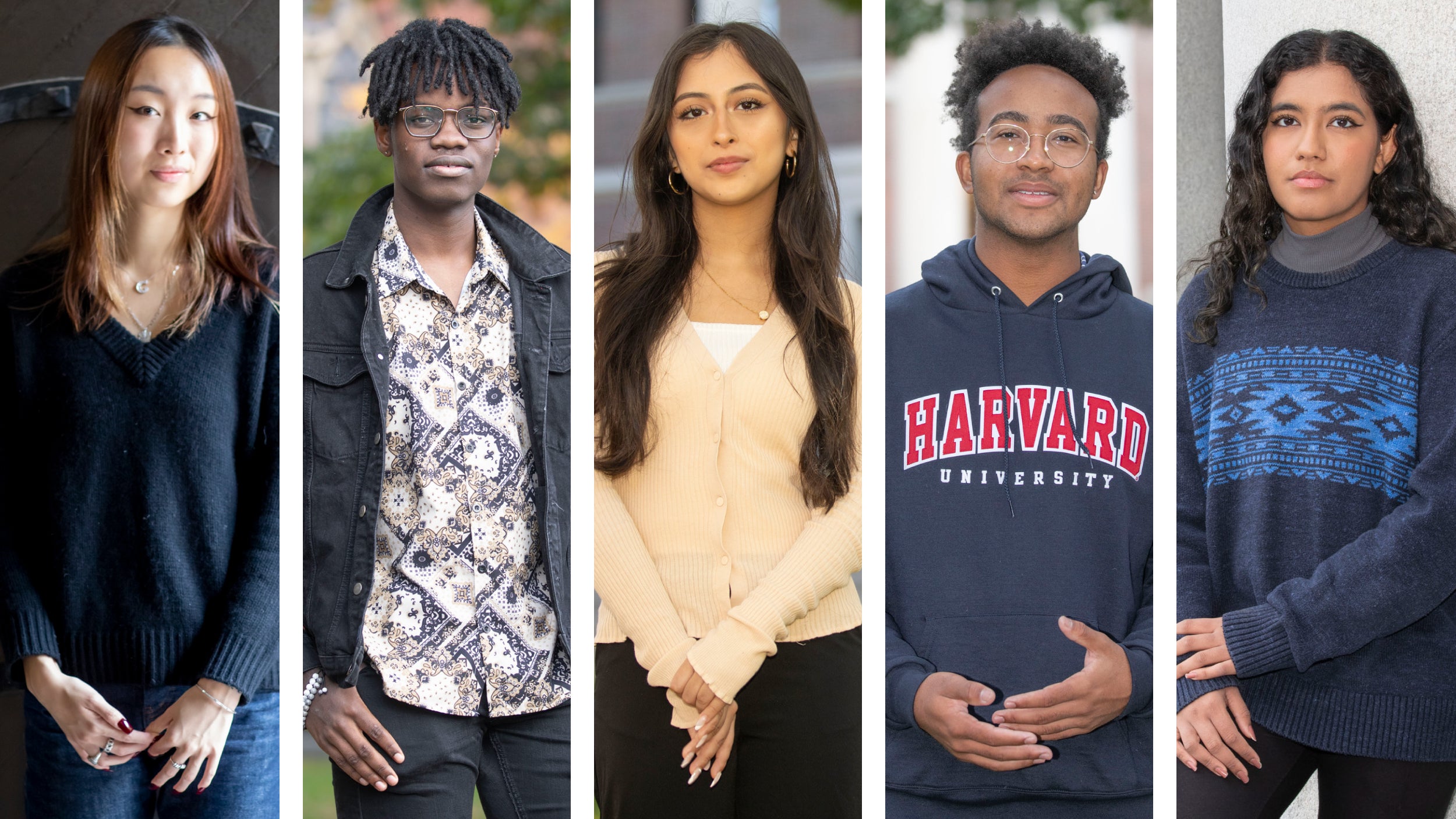
Chelsea Wang (from left), David Lewis, Soleei Guasp, Kylan Tatum, and Muskaan Arshad are among the 100-plus Harvard students headed to the Supreme Court this weekend to rally in support of campus diversity.
Photos by Rose Lincoln and Kris Snibbe/Harvard Staff Photographers
Harvard students head for Supreme Court rally
Will join groups from other schools, activists, lawyers in support of campus diversity as justices hear admissions challenge
More than 100 Harvard students are heading to Washington, D.C., to attend a Monday rally in support of campus diversity on the steps of the Supreme Court as justices hear oral arguments in lawsuits challenging admissions policies at Harvard and the University of North Carolina that use race as one factor among many in evaluating applicants.
The suits were brought by Edward Blum, a conservative critic of affirmative action, and his organization, Students for Fair Admissions (SFFA). The court’s decision could overturn decades-long Supreme Court precedents allowing admissions practices like those at Harvard and affect affirmative action at institutions of higher education across the nation.
“If this case falls through, it could lead to a completely different Harvard experience,” said Muskaan Arshad ’25, one of the campus organizers. “It’ll never be the same again, and that’s really scary to me.”
Since last year, Arshad has been networking and convening meetings, including a teach-in last month that drew 300 students. Harvard activists who are attending the Washington event say students from more than 20 different schools are expected to attend, along with civil rights activists, lawyers, and others.
“What scares me the most is the projected drop-off in the number of Black and Latinx students on campus,” said Kylan Tatum ’25, co-founder and co-leader of the Affirmative Action Coalition on campus. “I think it would be a great disservice to all institutions of higher education to sacrifice diversity in this way. If the point of higher education is to prepare students to succeed, we must make sure that the environment in which we’re learning is reflective of the society in which we’ll operate. Not acknowledging that the world we’re going into is one that is geographically diverse, socio-economically diverse, racially diverse, and diverse in so many ways is a great disservice to ourselves.”
“If the point of higher education is to prepare students to succeed, we must make sure that the environment in which we’re learning is reflective of the society in which we’ll operate.”
Kylan Tatum ’25
An intercollegiate statement written by students at Harvard, Princeton, and Yale rejected SFFA’s claims and affirmed the belief that race-conscious admissions policies support racial equity in education. The statement, which was signed by more than 100 students and activists, called on community members at all higher education institutions to pressure administrations to publicly support affirmative action. “Allies must take an active stance against all levels of inequalities in our society through active participation and education,” the signatories wrote.
Chelsea Wang ’25 said the “model minority” myth, which claims Asian Americans faced discrimination and still achieved success through hard work so it should be possible for anyone, has been used in the past to deny the systemic racism faced by people of color. “They’re pitting us against other people of color,” she said. “Most Asian Americans support affirmative action, and I don’t want to let my own community be used as pawns.”
Wang and Tatum serve the Asian American Association as co-chairs for the educational and political committee. Like Wang, Tatum said they were concerned by the lawsuit and how it appears to sow divisions between students of color, particularly between Black and Asian American students. The 19-year-old, who is both Black and Asian, said they know first-hand what it’s like to navigate those divisions.
“It’s very clear that this is an intentional project meant to divide people. It’s an appeal to the model minority myth, or the weaponization of Asian American socio-economic and educational success against other ‘problem minorities,’” Tatum said.
Leading up to the SCOTUS hearing, more than 25 student organizations, including the Black Student Association and the Asian American Association, co-hosted a September teach-in featuring lawyers from the NAACP Legal Defense Fund who laid out the background and details of the case.
First-year student Soleei Guasp, who attended the gathering, said it inspired her to join student efforts. The 19-year-old plans to attend the Washington rally with Latinas Unidas, one of the student groups that is part of the Affirmative Action Coalition.
Student activists also planned a week of action that began on Monday and ends with a rally and march today in Cambridge.
Students want to raise awareness about how much is at stake, and hope events like this help elevate stories like theirs. “I don’t know how much we can do to impact the case directly. [We’ve] done as much as we can do … but I think the biggest thing we can do is make our voices heard,” Arshad said.
For Wang, the fight for affirmative action goes beyond the classroom. “I am Chinese American,” she said. “I’m very proud of that heritage, and one of my favorite things about my culture is how collectivist we are. We believe in helping each other, helping our community, and putting others before ourselves, especially when it doesn’t benefit us. If I don’t support affirmative action, if I didn’t fight for what I believe is right … then I would be giving up that culture.”




